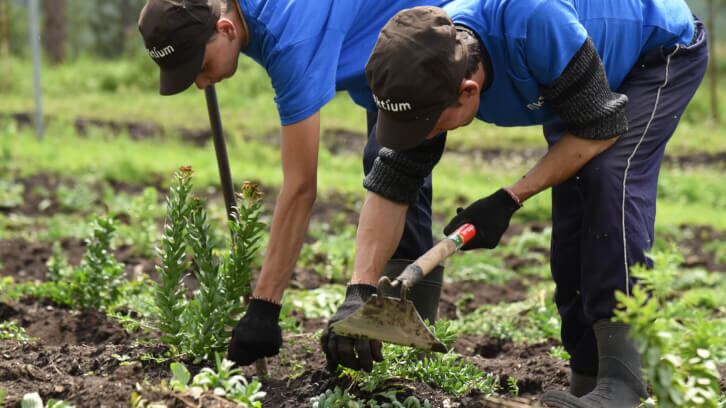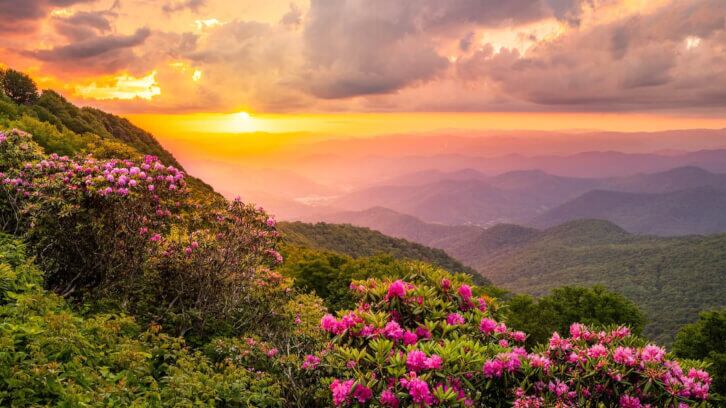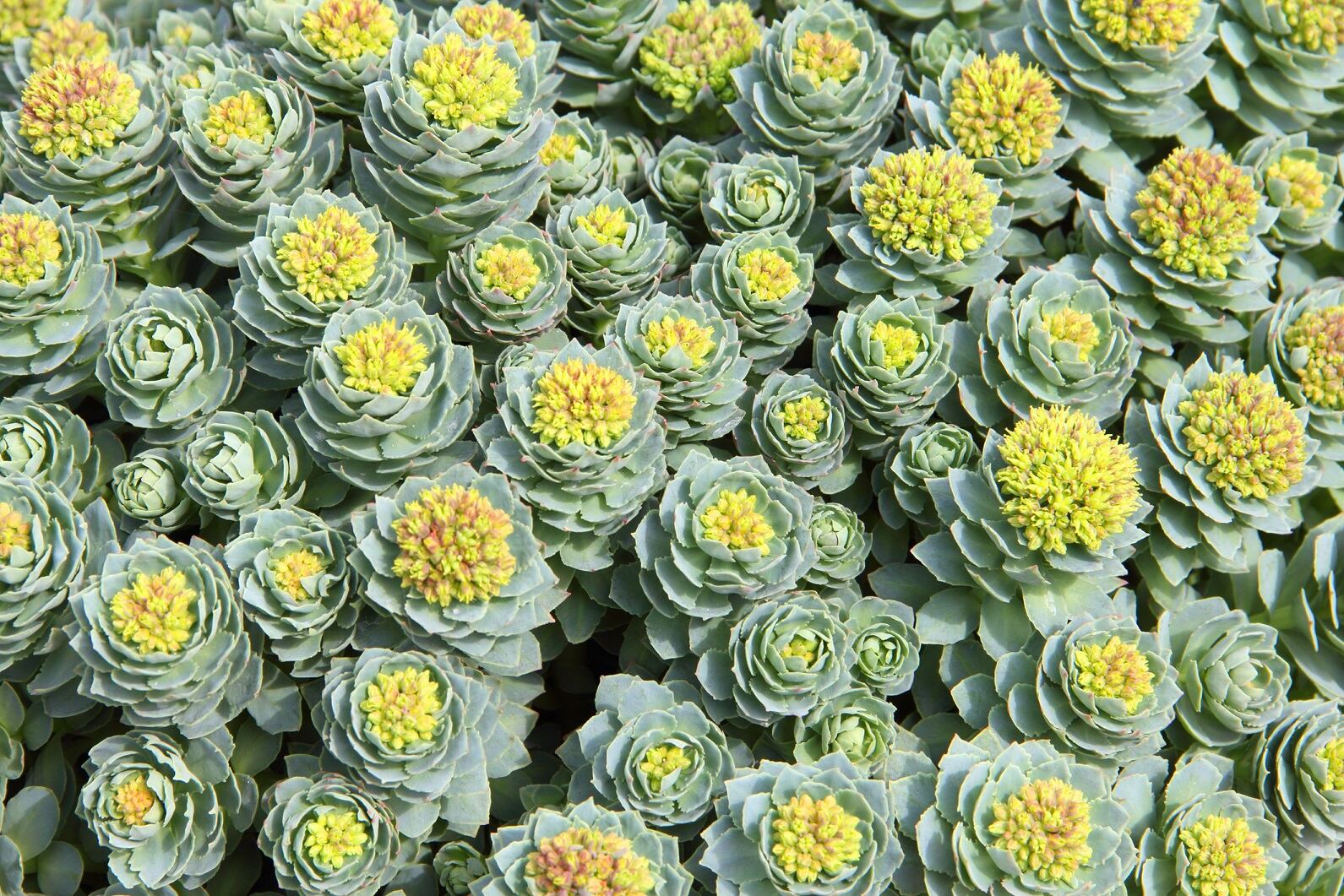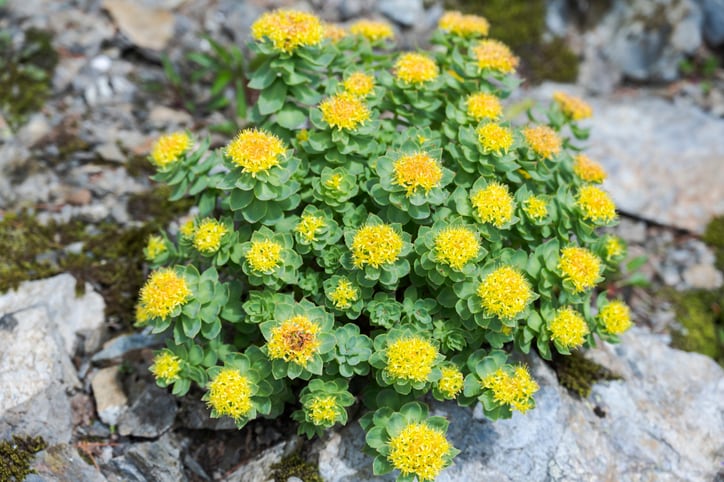“The level of illegal harvesting in protected areas and cross border smuggling is increasing annually coupled with increasing incidences of adulteration and substitution of R. rosea with other wild Rhodiola species, potentially negatively impacting the conservation status of their wild populations, but also an indicator of scarcity of the genuine article,” botanical experts reported in a 2021 review entitled "Running out of time to smell the roseroots“.
In the wild, the hardy perennial grows at cold, high altitudes in the subartic and alpine areas of Europe, Asia, and North America. It is in these harsh conditions that it develops its potent adaptogenic properties, currently sought after to elevate mood and improve mental health. Traditionally, it was used to boost endurance and relieve acute altitude sickness in Russia, Scandinavia, and other countries in Europe.
Not all member of the Rhodiola genus are created equal, however, with other species exhibiting significant variations in pharmacological and medicinal properties and R. rosea the most researched due to the efficacy of its active compounds.
Rise in popularity
According to data from market research firm SPINS for the 52 weeks leading up to April 23, 2023, total Rhodiola sales in the U.S. natural channel grew at 9.3%, increasing by over $1 million year-on-year to more than $13 million.
“The most popular subcategories include calmative and mood support supplements and reproductive supplements,” said Haleigh Resetar, corporate communications specialist at SPINS. “One new area where Rhodiola is starting to pop up is in energy drinks, while sales are low at just $66K, there is 550% growth for these products.”
Data from the Innova Database shows the number of product launches featuring R. rosea grew from 194 in 2017 to 432 in 2021, and a latest market forecast predicts that its revenue in the supplement market will grow at a CAGR of 9% to $38 million by end 2033.
This rapid and sustained growth has left the traditionally wild-grown plant vulnerable to overcollection at an industrial scale, prompting the inclusion of all Rhodiola species in Appendix II of the Convention on International Trade in Endangered Species of Wild Fauna and Flora (CITES).
The listing—which applies to “all parts and derivatives except a) seeds and pollen; and b) finished products packaged and ready for retail trade”—establishes specific requirements intended to protect a species from extinction, endangerment and exploitation in international trade.
In the 2021 review, the authors pointed to the need for sustainable wild collection standards and a transition from historical primary reliance on wild populations of R. rosea towards increased sourcing from conservation-oriented farms.
Transitioning to cultivation
While only a handful of commercially viable cultivation operations in Canada, Alaska, Siberia and several European and Scandinavian countries currently produce a small fraction of the global Rhodiola supply, cultivation is a growing alternative to supplement the stock and preserve the species.
Spanish nutraceutical company Nektium, which produces branded ingredient Rhodiolife, started its transition to cultivation over a decade ago. This involved prepping and planting barren land near the Siberian wild-grown supplies to replicate the species’ unique growing requirements and phytochemical profiles. The ingredient is distributed in the US by PLT Health Solutions.
Adriana Regidor, corporate strategy and sustainability director at Nektium, said that there are many benefits to cultivation.
“It gives us a more predictable and secure long-term raw material supply, which means improved price stability, superior safety, and more effective quality control,” she told NutraIngredients-USA. “It also provides customers with reassurance over adulteration, which is a major issue among many Rhodiola rosea extracts.”
She added that the plant’s five-year growing cycle does not provide fast economic returns but that Nektium now has a substantial cultivated area with plants at different stages of growth.
Preparing for trade after CITES
Rhodiola’s new CITES status confers a set of compliance controls for legal trade that require country-specific sustainability certifications and permits along the supply chain. The American Herbal Products Association (AHPA) updated its CITES Primer earlier this year to reflect the latest endangered botanicals and includes new information on importing and exporting specimens produced through “assisted production”.
Last week, Nektium announced that it had secured new CITES trade permits to commercialize its existing supply, both directly and through its network of global distributors. Chinese company JiaHerb also now markets CITES-compliant R. rosea extract for export.
“Our approved Rhodiolife stocks are sufficiently abundant to meet market demand for the foreseeable future,” said Bruno Berheide, Nektium’s commercial & partnerships director. “This is a major boost for the Rhodiola rosea category, which continues to thrive. At the same time, we are continuing to communicate regularly with our suppliers to guarantee compliant raw material from future harvests to ensure long-term continuity of supply.”
Dr. Petra Illig, who pioneered R. rosea cultivation in Alaska, called the CITES listing a “game changer” for growers in the northern state. She has transitioned to producing finished products but continues to promote R. rosea cultivation among the local growers even though she says that the concept of a farming cooperative has not caught on.
“We have a huge potential market advantage—not only being made in the USA but to leverage the Alaskan market advantage as being pure, pristine, clean,” she said. “Who doesn’t love Alaska?”




